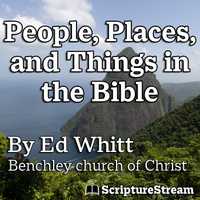Significance
- Descriptive?
- “From Dan to Beersheba”
- Meaning the entire length of Israel
- Judges 20:1; I Samuel 3:20; II Samuel 24:2, 15
- Reference from united kingdom
- “From Dan to Beersheba”
- Relevance to northern kingdom?
- Dan on northern frontier
- Bethel on southern frontier
- Same idea
- Opposites of Dan and Bethel
- Topographically opposite
- Geographically opposite
- Spiritually opposite
Bethel
- First excavated in 1927
- Continuous digs to 1960
- One find posited to be Abram’s altar
- Canaanite tombs, houses, olive presses
- Canaanite temple
- Fortified around 1750 BC – Luz
- City gates were found in pieces
- Destroyed early 12th century BC
- New settlement built after destruction
- Skip to later – captured by Vespasian in 69 AD
- Crusades
- Crusaders took it in 12th century AD and built churches there
- The name means, “House of God”
- Today it is the village of Beitin
- First seen in scripture in Genesis 12
- Lies in the very rocky terrain of Israel’s central ridge
- Jacob’s vision – Genesis 28:10-22
- He used a stone as a pillow for his sleep.
- After the vision, he consecrated the stone – poured oil on its top
- Named it “God’s House” or Bethel
- “Mansion over the hilltop”
- Jacob’s vision – Genesis 28:10-22
- Jacob flees to Bethel – Genesis 34-35
- Canaanites had a king there
- Defeated by Joshua and sons of Israel
- Ceded to Benjamin
- Border town
- Between Ephraim and Benjamin
- Between Israel and Judah after split
- During conquest, Benjamites failure
- Didn’t drive out Jebusites
- House of Joseph went up against Bethel
- The Lord was with them – Judges 1:21-22
- Later (Judges 20-21)
- Bethel center of ops – Israel versus Benjamin
- Place of council in aftermath
- Deborah judged Israel (Judges 4:5)
- From under a palm tree
- Between Ramah and Bethel
- Samuel – circuit judge (I Samuel 7:15-17)
- Four-town circuit
- Bethel, Gilgal, Mizpah, Ramah
- Saul’s encounter after being anointed by Samuel
Dan
- Near headwaters of Jordan
- Occupied more than 6,000 years ago
- Abandoned about that time
- Rebuilt 1,000 years later
- Free-standing mud brick arches
- Oldest ever found
- Called Abraham’s gate
- Conquered by Tuthmosis III in 15th century BC
- Tel Dan Stele – 9th century BC
- Stele heralded initial conquest
- Assyrian Tiglath-Pileser III
- Included “David King of Israel”
- Other Historical info confirming scripture
- Digs confirm idolatrous practices
- Stele heralded initial conquest
- Little mention prior to Jeroboam’s rule
- Abram defeated forces of Sodom and Gomorrah there
- Descriptive “north-to-south” statements
- Center of northern migration of tribe of Dan
- Danites impatience – spies go north (Judges 18)
- Find Laish
- Take small force
- Seize Levite and the idols of Micha
- Capture Laish, named it Dan
Jeroboam
- Jeroboam’s concern
- Life, power – I Kings 12:26-33
- Made two golden calves
- Places them in Bethel and Dan
- Designated a feast
- Posted priests
- Made sacrifice
- Prophecy of Josiah’s reforms – I Kings 13
The abominable calves
- Major subject of idolatrous worship
- Multiple regional cultures used calves, bulls
- Egypt – where Israel spent 400 years
- Crete – where Philistines frequented
- Persia – to the east
- Anatolea – to the north
- India – farther east
Some lessons
- Don’t hang our hat on a town’s reputation
- Don’t compromise faith for life or power
- Don’t have a “when in Rome” attitude
